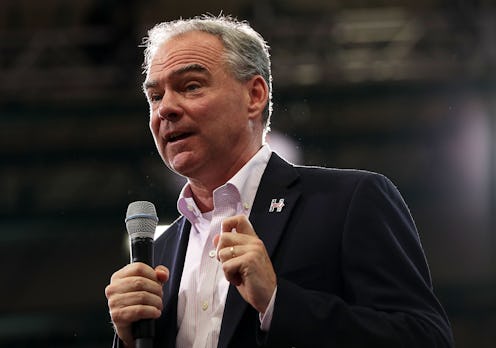News
Here's Why You Shouldn't Miss The VP Debate
Hillary Clinton and Donald Trump had a whopper of a presidential debate last week, and they’ll soon meet again for a town hall-style forum in St. Louis, Missouri. But before that happens, voters will have the chance to watch Tim Kaine and Mike Pence square off at the lone vice presidential debate on Oct. 4. While it probably won’t get nearly as much attention as any of the Clinton-Trump slugfests, the vice presidential debate is just as important as the presidential forums, albeit in very different ways.
For one, in this election year particularly, the VP debate will probably be good for the nation’s collective blood pressure. Kaine and Pence — their political views aside — are both calm, boring, run-of-the-mill politicians. While they’ll assuredly butt heads repeatedly throughout the debate, witnessing a sit-down between these two will offer us all a refreshing (but sadly temporary) retreat back into sanity amid an utterly insane presidential election.
Moreover, although it’s very unlikely that Kaine or Pence will ascend to the presidency without running for president on their own, the fact that they’ve been picked as running mates does reveal things about the people who picked them. That being said, it’s important to get a sense of who they are, even if it’s only to judge the folks at the top of the ticket.
Trump, for instance, has quietly positioned himself as an LGBT-friendly Republican, and there’s hope within the more socially-moderate circles of the GOP that this could help push the party away from its decades-long GOP opposition to gay rights.
However, this theory is undercut by the fact that Trump chose Pence as his running mate. Pence has a long history as an anti-gay crusader, but that doesn’t quite capture the extent of his views on the matter. It’s not just that he’s opposed marriage equality, anti-discrimination protections for LGBT people, and the repeal of "don’t ask, don’t tell." Those views — which, let’s not mince words, are morally abhorrent — could conceivably be chalked up to the fact that Pence is a Republican and was just following the party line.
But Pence went way beyond those standard-issue Republican policies. He also proposed eliminating funding for HIV treatment centers, arguing that such organizations “celebrate and encourage the types of behaviors that facilitate the spreading of the HIV virus.” Instead, Pence argued, this federal money should go to anti-gay conversion therapy groups.
It’s bad enough to passively go along with anti-LGBT policies in order to appease your base, but that’s not what Pence has been doing. Even by GOP standards, proposing federal funding for anti-gay conversion therapy is an extreme, an outlier position. Pence appears to be a true believer in his anti-gay views — more of a Rick Santorum than a Mitt Romney.
This fact casts Trump’s position on LGBT rights in a different light. How can a candidate truly be a friend to LGBT Americans if they put a committed anti-gay politician like Pence on the ticket? They can’t — which is evidenced by the fact that, for all of Trump’s popularity among pro-LGBT Republicans, his campaign expended little to no effort to actually moderate the party platform’s language on LGBT issues.
And that’s why the VP debate matters. It’s the only time during the campaign that a spotlight is placed on the running mates’ positions, and this helps us contextualize the presidential candidates in new ways. Pence’s LGBT views are just one example; when the VP debate is over, we’ll have a better idea of where he and Kaine stand on any number of issues.
That — and of course the whole blood pressure thing — make watching this debate pretty important. It will air on Oct. 4 at 9 p.m. ET.
